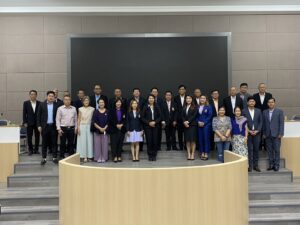[ad_1]
…as local businesspeople demand their urgent implementation
Mathatisi Sebusi/ Leemisa Thuseho
INDIGENOUS Basotho businesspeople from various sectors are demanding that government urgently implements the controversial Business Licensing and Registration Regulations, 2020.
They recently convened for a crisis meeting calling on the line ministry, Ministry of Trade, Industry and Business Development, to swiftly implement the regulations.
The sub-laws emanate from the Business Licensing and Registration Act, 2019.
During a Basotho Business Empowerment Forum, organised under the auspices of the Micro, Small and Medium Enterprise Association at the Victory Hall in Maseru on Wednesday, the indigenous Basotho business owners claimed that the government, had not demonstrated interest in implementing the contentious regulations.
Both the Act and regulations, seek to exclusively preserve over forty (40) business sectors for indigenous Basotho businesspeople.
As the per the regulations, the 47 reserved business sectors include among others motor dealership, mobile food services and other food services, hair dressing and clearing agent.
Included also are real estate agency, retail of bread and confectionery products, sale of motor vehicles parts, sale of alcoholic beverages (off-sales, taverns, public bars), metal waste / scrap; as well as sale of animal feeds, fast food activities, sale of second-hand goods,?shisanyama?outlets, sale of fruits and vegetables and pharmaceuticals to mention a few.
The forum was staged in a bid to promote and facilitate meaningful participation of Basotho owned enterprises across all sectors of the Lesotho economy.
Implementation of the regulations would see foreigners who own businesses in sectors reserved for Basotho, being forced to leave those select industries.
Representing the vendors’ sector at the meeting, ‘Maremi ‘Mabathoana, said delaying implementation of the regulations continued to subject them to unfair competition from foreign-owned businesses in areas that should by “right be reserved for and operated by Basotho”.
“We have for a long time now, been on a journey to fight for the survival of Basotho businesses. But we are still enduring unfair competition from foreigners who continue to operate businesses that are reserved for Basotho,” Ms ‘Mabathoana said.
“The foreigners are into hairdressing. They are into food services businesses as well as selling alcohol. I think it’s high time we say enough is enough. Our businesses are dying.”
For his part, Thobi Motlere from the retail sector, said Basotho businesses were seriously endangered hence the need for action to “save them now, not anytime later”.
“We are in serious danger and if implementation of the law in full is not happening now, I do not see it happening in future either,” Mr Motlere said.
“We want our business industries back from the foreigners’ hands. We want the Business Licensing and Registration Regulations to be implemented now. We are tired of the excuses.”
Meanwhile, addressing the event, Ministry of Trade, Industry and Business Development Principal Secretary, Thabo Moleko, said his ministry was working on “how best the regulations can be implemented”.
He said the ministry had even invited a native business owners’ representative, to be part of the task team working on the implementation of the legislation.
The task team, Mr Moleko said, even went to Botswana to assess how that country had implemented similar legislation.
“We have been working together with the businesspeople. We even had to go to Botswana to study how they managed to have finally implemented the same legislation,” Moleko said.
“We have reports from the tour and indeed there needs to be some changes as we work towards implementation of the legislation.”
Mr Moleko also assured the indigenous business owners, that the regulations would eventually be implemented.
“The legislation will finally be implemented. As far as I know, we are walking this journey together. Let’s go back and continue from where we left while giving all the concerned stakeholders a chance to play a part in how the legislation can be implemented.”
In February this year, the Minister of Trade, Industry and Business Development, Mokheli Shelile, told the?Sunday Express’?sister paper, the?Lesotho Times, that Basotho should exercise patience.
He said this was because the regulations were “very controversial” and their implementation “needs to be carefully handled” to avoid “risking relationships between the Lesotho government and other foreign governments”.
He said this was not the kind of legislation to implement overnight.
“We also must be careful not to violate the rights of foreigners who own businesses?in sectors reserved for Basotho as per the regulations. We need to give them time to wind up their operations,” Mr Shelile said at the time.
[ad_2]
Source link




